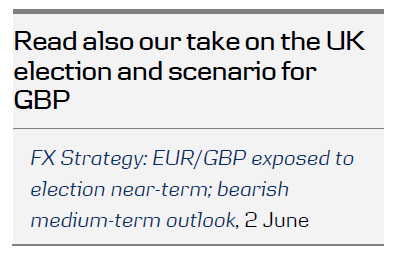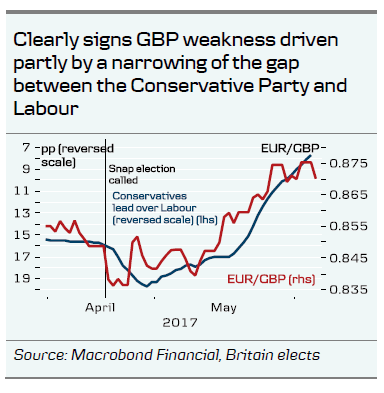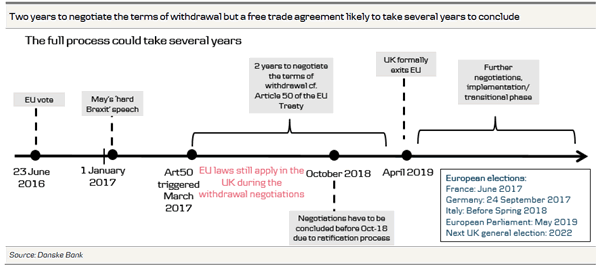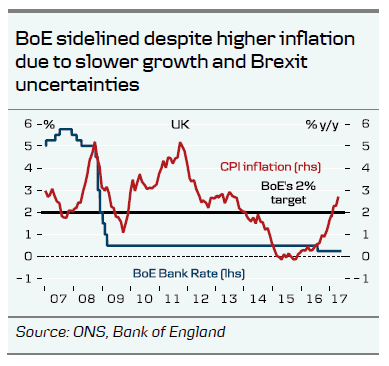- In this piece, we present the main takeaways from our recent trip to London.
- All we met expect PM Theresa May to win the UK election despite polls narrowing. How UKIP voters vote in Brexit constituencies may be decisive for the outcome.
- Still, the Conservatives may regard the election result as a disappointment, making Theresa May less powerful and vulnerable to hardline Brexiters.
- There is a consensus that a Conservative victory would be positive for GBP in the short term. A hung parliament is the most negative scenario.
- We seem to be alone in the view that a governable coalition between Labour, LibDems and SNP would be positive for GBP on 3-12M due to the softer Brexit among the three partiers (expected range 0.75-0.80).
- The most difficult part of the Brexit negotiation is the beginning (not least the settlement of the ‘divorce bill’). Most expect a free trade agreement covering goods but not services to be concluded in three to five years.
- The Bank of England is sidelined despite higher inflation due to slower growth and Brexit uncertainties.
Theresa May still set to win – we expect GBP to rally afterwards
Despite the polls having narrowed, PM Theresa May is still expected by most to win the UK election and get a bigger majority than at present but smaller than expected at the beginning of the negotiations. Even if Theresa May regains power, the election may be considered a disappointment by the Conservatives if she wins by less than 80 seats, making it more likely that Conservative backbenchers will make things more complicated for her in the new election term. One bank argued that one should not over-interpret the movements in the opinion polls, as previous UKIP voters are key for the outcome of the election. If UKIP voters opt for the Conservatives in currently Labour-held constituencies, which voted for Brexit in the EU referendum, the mandates may shift to the Conservatives, implying that they may still win a solid majority. Whether the size of the majority will be large enough for Theresa May to avoid being vulnerable to hardline Brexiters is hard to predict, as it depends on the Brexit stance on new members of parliaments. Most expect GBP and UK assets to (relief) rally in case of a Conservative victory, regardless of the size of the victory, as it would remove one source of uncertainty. How big a rally depends on the size of the majority.
A ‘hung parliament’ (i.e. no party wins absolute majority in the House of Commons) is seen as the most negative scenario, as it would increase the political uncertainty significantly in a situation where it is high to begin with. This would be GBP negative.
We seem to be alone in our view that a governable coalition between Labour, LibDems and SNP would be positive for GBP on 3-12M due to the softer Brexit stance among the three parties. One bank argued that markets will instead focus (among other things) on UK public finances, as Jeremy Corbyn has some expensive promises in his manifesto.


Brexit negotiations set to be difficult
A base case scenario for Brexit has been formed, assuming Theresa May regains power in the UK. Regardless of the size of Theresa May’s majority, we are heading for a hard Brexit, with the UK leaving both the single market and the customs union. However, her flexibility depends on the election outcome. A slim majority will make Theresa May vulnerable to hardline Brexiters, increasing the risk of a ‘no deal’ Brexit, while a bigger majority makes a smooth Brexit more likely (what we have labelled a ‘decent Brexit’ ourselves). Experts expect the most difficult part of the negotiations to be in the early stage, as the UK wants to negotiate withdrawal terms and future relationship simultaneously while the EU wants a phased approach by settling the withdrawal terms first (not least the so-called ‘divorce bill’) before moving on to discussing a free trade agreement. While it is difficult for the UK Prime Minister to sign a divorce bill in the range of EUR60-100bn without knowing the future relationship, a compromise could be to agree on the calculation principles before doing the actual calculations at the very end of the discussions. No one expects a possible free trade agreement to be concluded within two years, so we are likely to have a transitional period, where the discussions can continue. The free trade agreement is likely to cover goods but not services, which will hurt the service-oriented UK economy in the long term. One concern is that the UK does not have the necessary staff either to negotiate Brexit or afterwards when the UK takes over bureaucratic responsibility for itself from the EU.

Growth to remain weak short term – Bank of England sidelined during Brexit negotiations
Looking at the economy, we are pretty much in line with the consensus view. Most expect UK growth to continue slightly below trend growth of 0.4% in the short term (no recession although unemployment may begin to tick up slightly). The main reason is the real pay squeeze, which slows private consumption growth and business investments are unlikely to take over due to Brexit uncertainties. Also, we are yet to see a positive impact on net exports as the import content of exports is high, i.e. the weaker GBP increases import prices thus offsetting the positive impact on export prices. Inflation is expected to peak around 3% later this year but consensus is that the Bank of England will see through this due to concerns about economic activity and Brexit uncertainties. Like us, most expect the first hike from Bank of England at the earliest in mid-2019 after the withdrawal negotiations are concluded. A game changer could be if wage growth accelerates and responds to higher actual inflation at some point but this is considered unlikely.

